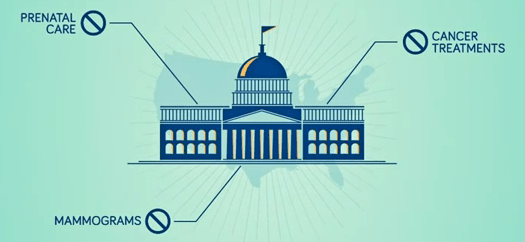
There are many ways to define yourself. You could do it by the decade into which you were born. Or which party you usually vote for. Or whether you prefer Coke or Pepsi. Or, as this past election proved, how you feel about abortion or women in general.
Before 1973, you might have been anti- or pro-abortion or, conversely, anti- or pro-forcing all pregnant women to deliver to term. Since Roe v. Wade, however, you’re generally either pro-life or pro-choice.
But, now that Planned Parenthood has experienced some of their toughest years for defending their funding, they’re getting rid of the pro-choice label to fight for … well, abortion … but, well, sometimes … Oh, hell. Let them just explain it with their video like we’re in health class all over again:

All in all, they’re saying that abortion isn’t a black or white issue, it’s a lot of individual shades of gray, which they’ve helpfully illustrated with matching “pro-life” and “pro-choice” gray labels … Goddammit, Planned Parenthood.
Alright, yes, PP is right to say that abortion is more complicated than just being pro-life or pro-choice. For instance:
- “Pro-life” doesn’t necessarily mean legally declaring all American wombs incubators for future liberty. You just might be very much in favor of babies except in rare medical cases, or in the event of rape or incest. That, however, would indicate the ability to make a choice, making you essentially pro-choice … just on a limited basis.
- “Pro-choice” doesn’t always mean you need a choice, just whenever … you take into account your particular situation and your personal ethical and moral background to make a
choicedecision.
Seriously. That’s the dilemma that PP currently experiences when forced to choose between supporting no abortion or the ability to choose to have one, you know, if you want to. Or need to!
Sure, one could choose abortion sometimes, but how do you debate the rest of that statement without asking the government to step in and pass a law? And we know they’re willing to do it, too. A congressperson near you right now is ready to concern troll you during your decision process, whether believing you haven’t heard your baby’s heartbeat or given the man who raped you a chance to “man up.”

So, if PP isn’t in the pro-choice business anymore, just what business is it in? Women’s health, of course, which usually means providing access to perfectly legal medical procedures that certain socioeconomic forces have put out of reach for women who would like to, you know, have a choice. So, yes, Virginia (and Mississippi), PP is still pro-choice. Technically.
PP’s real problem here is that “pro-choice” is now a dirty liberal word. I know this because conservatives can’t say it without sneering. (Other dirty liberal words include “community organizer,” “teleprompter,” “Planned Parenthood” and “feminism.”)
So, just like women who demand equal pay, health care and treatment by the law, but don’t want to jinx it by calling themselves “feminists,” so, too, has Planned Parenthood solved the Rush Limbaugh problem: by quietly going along with it and pretending it was their idea the whole time.

And their timing, of course couldn’t be better: 70 percent of respondents to a recent NBC/Wall Street Journal poll said they oppose overturning Roe v. Wade (the highest pro-choice percentage since 1989). And it’s mostly because of that sticky 2012 election when always pro-life Republican candidates managed to alienate their sometimes pro-choice women voters by sharing everything they know — and don’t know — about rape.
So, maybe the answer isn’t to be pro-choice anymore. Maybe it’s time to be anti-ignorance-while-making-your-choice. But it sure as hell shouldn’t be pro-nothing.


It seems that too much attention is paid to the child’s birth, but not enough to what happens afterwards — living standards, education, etc.
Nicely stated. We often spend way too much time on the semantics of an issue rather than the symptoms.